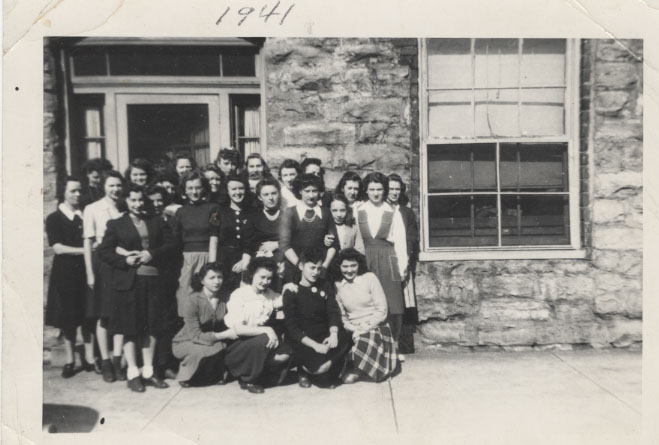
The Tennessee State Library and Archives in Nashville recently conducted an oral history interview with Leon May so that details about the charitable activities and community leadership of his father, Mortimer, would be available for future generations. “My father was basically a humanitarian,” Leon May, born in 1922, explained during the interview. During the 1930s, Mortimer May, along with his son Leon, made several visits to Europe in order to help fellow Jews leave Germany as the Nazis slowly tightened their grip over the Jewish people. “The persecution, they increased it, increased it, and increased it,” May stated.
Mortimer and Leon May had a number of relatives still living in Germany during the 1930s. The patriarch of the May family, Jacob, was born in Germany in 1861 and later settled in America in order to begin a new life. He is known for establishing the May Hosiery Mill in Nashville in 1909; previously, he had established the Rock City Hosiery Company after being awarded a contract with the state of Tennessee to employ convict labor.
Taking his family with him, Mortimer left Nashville to visit Germany in 1928. Mortimer had earlier been especially touched by the traditional Jewish life his family was leading in Germany, especially because the Reform Judaism that he practiced in America was not as strict or observant. In fact, May was becoming more and more interested in the Zionist cause. During this visit, which was the first for Leon, the impending menace of Hitler and the Nazi party was not apparent to many Jews. Many of Leon’s relatives, including his Uncle Moses, were loyal to Germany and never believed that they would be persecuted in the coming decade. His uncle had served in the German army during World War I, and had no desire to leave the country. During this trip, Leon remembers taking “the Grand Tour” of Europe, and did not sense that in ten short years, the mood of Europe would be greatly transformed.
Leon’s next trip with his father was in 1934, to Strasbourg, which is located on the French and German border. Leon was only 12, but he remembers two family members deciding to leave Germany at this time to come to America. By 1936, when Leon and his father returned again, the Jews “were beginning to want to get out.” Leon believes that his father helped about 200 Jews escape Germany before the war started; some were relatives, but many were neighbors or friends. May explained, “If you could get a connection” with an American sponsor, it was easier to obtain a visa to leave Germany. Mortimer May worked with the American consulate in Stuttgart to expedite the departure of those he was helping. Leon was 14, but he vividly remembers the Nazi flags that were omnipresent in Stuttgart, and the countless Germans who were in uniform. Despite this strong Nazi presence, Leon and his father, as Americans, were never bothered by the German government during this visit. May believes that the Germans were on their best behavior because of the 1936 Olympics.
When the Mays returned in the summer of 1938 for their last trip to Germany, only months before Kristallnacht, the situation had deteriorated. After a trip to the local synagogue in Hoechst, officials confiscated Mortimer’s film from his camera. May notes that as a consequence of this action, his father was concerned about his family’s safety in Germany, but he did not feel threatened himself. May was still able to help more German Jews escape; in fact, it was only after Kristallnacht in November of 1938 that May’s Uncle Moses finally realized that he needed to leave Germany. One of the factors that allowed Mortimer to convince American authorities to take more Jewish refugees was the fact that his family had a successful business in Nashville and would be able to provide jobs for many of the immigrants. “We employed quite a few of them,” May notes. While Mortimer was busy bringing fellow Jews back from Germany, his brother Dan and father Jacob were keeping the mill afloat.
The Mays were able to return to Europe one more time in August of 1939, but they did not visit Germany. Instead, Mortimer attended the World Zionist Congress in Switzerland. Mortimer May had become a devoted Zionist who eventually served as the President of the Zionist Organization of America, an unusual achievement for a Jew of German descent living in the American South. Immediately after this conference, the war in Europe started. Leon May remembers sailing back to the United States under a blackout, but he laughs that he was too young to appreciate the danger at the time. Unfortunately, some of the May family members were killed by the Nazis during the war, including Leon’s Uncle Abraham.
Reflecting upon his father’s service to his fellow German Jews, May observed that early on, his father “recognized the menace of Hitler” as well as the “danger of Stalin.” During the war, the May Hosiery Mill assisted in the war effort with its machine shop in the factory. The mill was able to produce proximity fuses for mortar shells. Leon served at Pearl Harbor under Admiral Nimitz, and saw President Roosevelt come to Pearl Harbor in 1944. Although his family was supportive of FDR because they believed he could win the war, May notes that his family has always defined themselves as Republicans. He joked that his uncle Dan once said that the “Mays were Republicans when it was still an underground movement in Middle Tennessee.”
Mortimer May continued to work for the Zionist cause throughout his life, an effort that was documented by Sam Shankman in his book “Footsoldier in Zion.” Mortimer was also a supporter of African-American rights, and believed that blacks were not being treated fairly in the South. In 1954 and 1955, Mortimer was the President of the Zionist Organization of America. After the birth of the State of Israel in 1948, he continued to advocate for Jews and weigh in on the state of foreign affairs. Shankman has published many of his writings and speeches. After a lifetime of service to the Jewish people, May died in 1974.
The legacy of May’s generosity to the Jewish community continues, as many descendants of the men and women he helped to escape from Germany are alive and well today. By believing that he could make a difference, and more importantly, acting upon it, Mortimer May has saved hundreds of lives, both from his generation and beyond.
